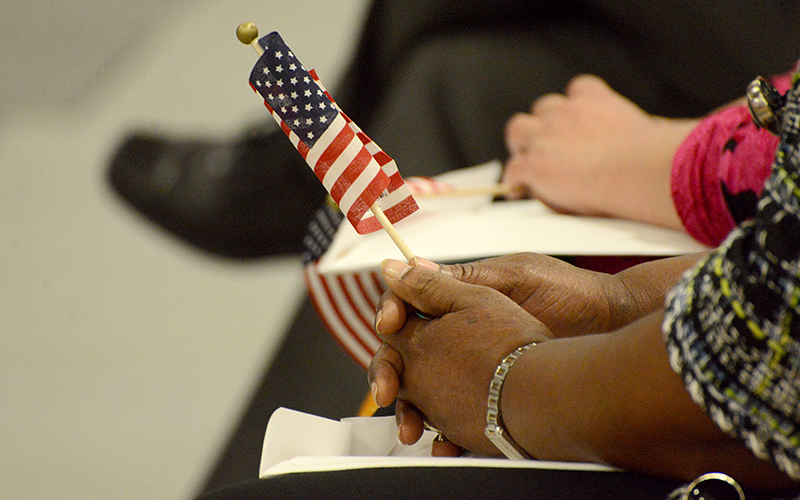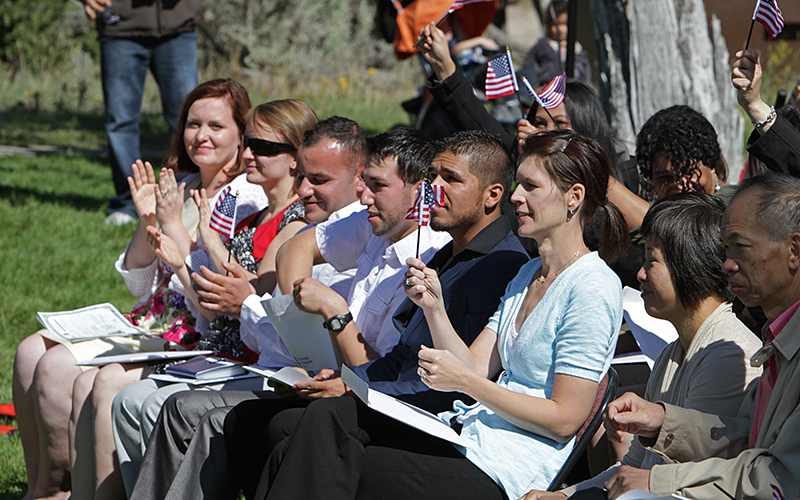WASHINGTON – Federal officials who typically see an increase in citizenship applications during presidential election years said that applications in this heated election season appear likely to surpass expectations.
More than 725,000 naturalization applications were submitted through the first three quarters of fiscal 2016, according to the most recent numbers available from U.S. Citizenship and Immigration Services. That is on pace to surpass the 899,162 applications in fiscal 2012, when the agency had received 669,856 applications through the first three quarters.
“USCIS anticipated that there would be a spike in applications this year, as we usually see in an election year, but the increase in N-400 applications has exceeded expectations,” said Jim McKinney, an agency spokesman, in an emailed statement.
McKinney said the agency would not speculate on possible reasons for the increase in applications. But immigration activists say the reason is clear.
“Donald Trump and his hateful rhetoric have engaged and encouraged residents of over 30 years,” to apply for citizenship this year, said Pita Juarez, a spokeswoman at One Arizona, an immigration advocacy group.
Trump, the Republican presidential nominee, first made waves on the campaign trail with his call for a border wall that the Mexican government would fund and for mass deportations of illegal immigrants, many of whom he claimed were criminals sent here by Mexico.
“When Mexico sends its people, they’re not sending their best,” Trump said in his campaign kickoff in June 2015. “They’re bringing drugs. They’re bringing crime. They’re rapists. And some, I assume, are good people.”
Juarez said her organization has been forced to extend its citizenship classes after upwards of 80 people registered for a single class, with most pointing to Trump’s rhetoric as their motivation for getting citizenship.
Michael Jarecki, an immigration lawyer in Chicago, said a large portion of his clients – including documented immigrants – were motivated to seek citizenship by a fear that they could be deported, even if they had a “perfectly legal green card.”
“Those who are legal with permanent residence are fearful of Trump, based on the things he said as a candidate,” Jarecki said.
“They don’t want to live in fear, knowing that the government might tear them away from their families, their jobs,” he said. “So they are looking to upgrade their status, even though they have a perfectly legal green card.”
But the heightened interest brings another set of problems: The growing number of applications has led to a backlog of more than 1.3 million cases nationwide through the third quarter.
For USCIS field offices in Phoenix and Tucson, that meant there were 22,908 applications pending through the third quarter of fiscal 2016. Advocates said the agency should have foreseen the increase and prepared for it, but McKinney said processing time for applications in Arizona are consistent with the nationwide average of five to seven months.
“As of the latest data available, reported on July 31, Phoenix was processing applications dated Jan. 21, approximately a six-month processing time,” McKinney’s email said. “Tucson was reporting a five-month processing time.”
He said the agency has taken steps to combat the number of backlogged applications, including outsourcing staff to field offices with increased workloads and authorizing overtime at various locations.
But activists said more needs to be done. Juarez noted that many of the people who signed up for her organization’s citizenship classes did so “to make sure they were registered to vote by the right time.”
Jarecki said USCIS should have seen this coming.
“We turned a corner in 2016 and that’s when the election became much more real and heated for people,” he said. “The agency should have known that a byproduct of this response would be applications through the door in time for the election.”
But demand will not stop Nov. 9, Jarecki said, and the agency needs to look ahead.
“We have to make sure the agency continues to find additional resources” to fight the backlog, he said. “Elections and voting are one reason, but there are many other reasons, including pride, that motivates people to apply for citizenship.”

